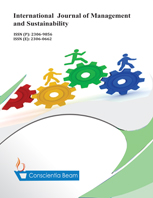Cumulative Average Abnormal Return and Semistrong Form Efficiency Testing in Indonesian Equity Market over Restructuring Issue
Abstract
Efficient market hypothesis is important in finance. Investors will expect superior gains from their investment strategies with respect to the risk profile. Event study is an approach to assess the impact of the information on the stock prices. If the market is efficient, the price of securities will be adjusted quickly to the announcement day. The objective of this study is to test the efficiency of Indonesian Stock Market in semi-strong form with respect to 19 recent merger announcements since year 2000. In order to analyze the effect of the announcement, Event Study Methodology is conducted by calculating the Abnormal Returns (AR) of each stock, Average Abnormal Returns (AAR), and Cumulative Abnormal Return (CAR) 30 days prior to the merger announcement and 30 days after the merger announcement (event window). To calculate the Abnormal Return, market model is employed by regressing the daily stock return with the corresponding market return on the estimation period. Parametric and non-parametric test on the AAR is used to test for efficiency. The findings from this research is that Indonesian stock market is efficient in semi-strong form in the case of merger announcements.

